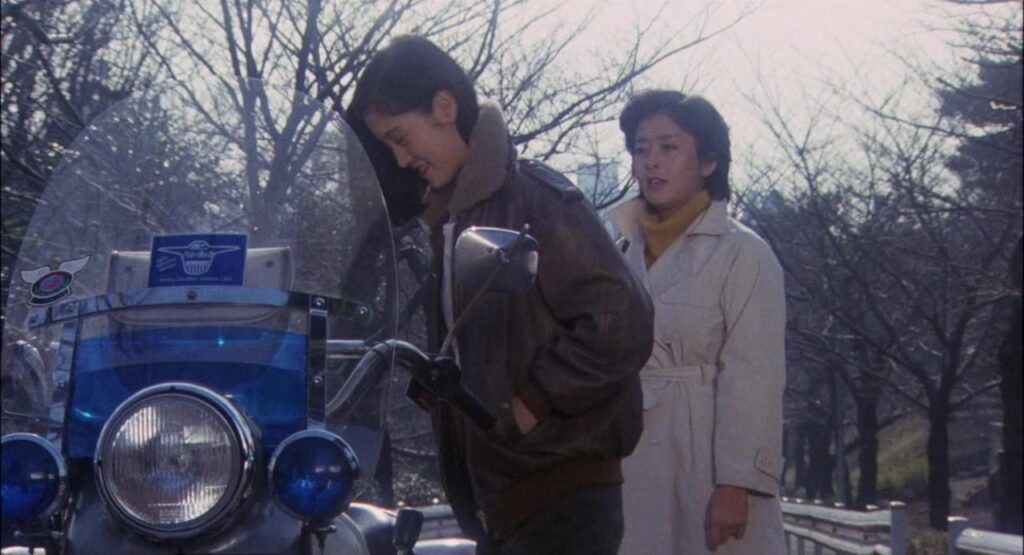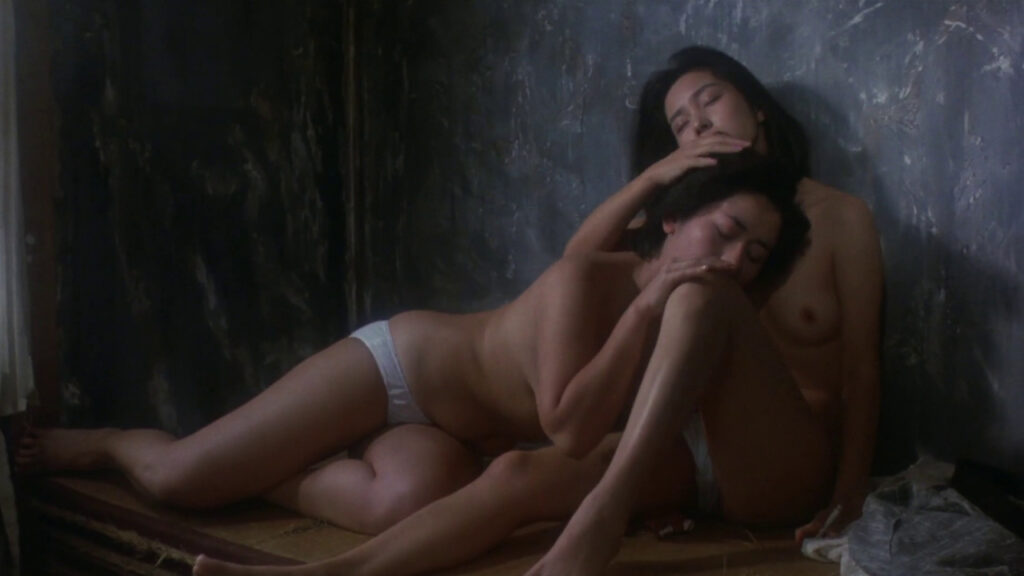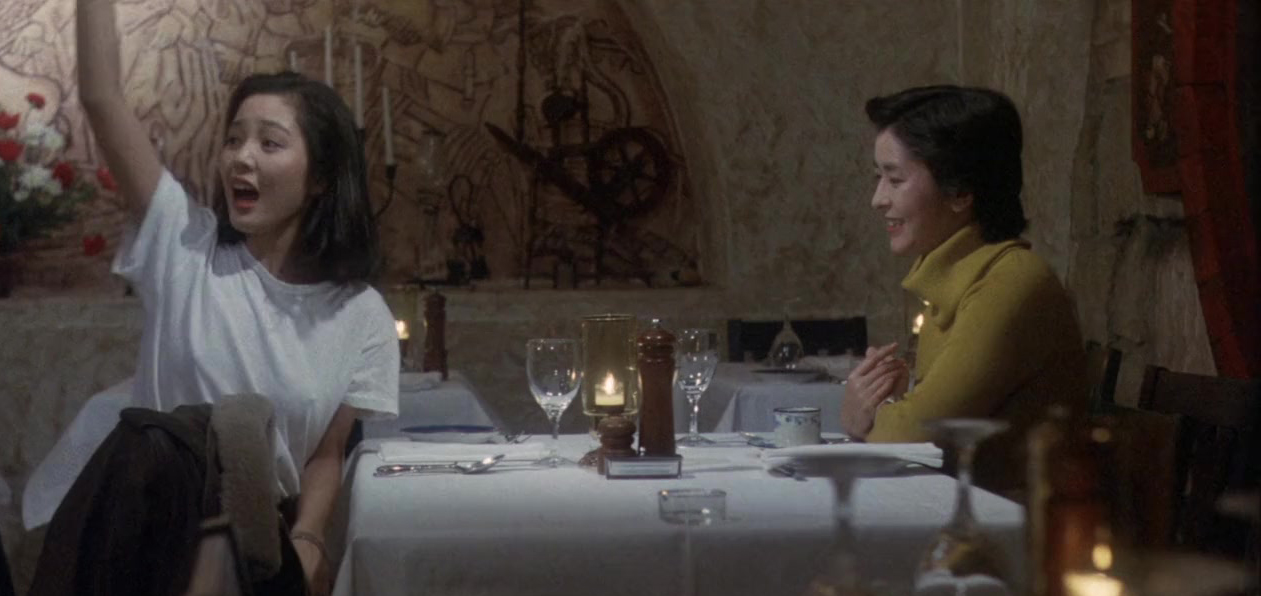This is the second version of Manji that I’ve seen, the first being a film from 1964. There are still two other adaptions I have yet to see. Despite the films being more different than I anticipated, a lot of this review is comparing this 1983 version of Manji to the 1964 version.
This version of Manji begins with housewife Sonoko stealing something from a shop. Sonoko catches a younger woman see her do this. So, she follows the woman back to her apartment to plead for her silence. The woman, Mitsuko agrees but rapidly turns their interaction to unnegotiated BDSM. Mitsuko hits Sonoko, and Sonoko begs her to do it again. Then, Mitsuko bids her to drink spilled milk from the floor before doing this herself. So that’s the start of their very passionate relationship. The two women continue in this vein despite Sonoko having a husband. Soon, her husband becomes wise to her female lover as Sonoko is being super obvious about it. Somehow though, the women convince him to allow them to carry on their affair, sometimes at he and Sonoko’s apartment. Somewhere in the proceedings, Mitsuko begins involving Sonoko’s husband in this whole weird situation which makes Sonoko jealous.

I was really surprised at how different this version of Manji was from the original short story or 60’s version. That’s probably a big reason why I liked it. I expected to go into this movie and know the plot. But this is a very different story. The only similarities is an affair between two women where one of their husbands disapproves but eventually gets involved. The journey to that point is different, as is the film’s endings. Beyond story, the two versions different greatly in terms of focus. The 60s movie feels more cerebral and lower key. Its best element is very much its visuals and cinematography. 1983 Manji is incredibly physical and frank. The best element here is the story, the visuals are nothing to write home about.
Where I think this version of Manji is more successful than the original is its portrayal of Mitusko and of her relationship with Sonoko. Mitsuko being neither crazy nor desirable enough was a point of contention for me with the original version. Not so with this Manji. Mitsuko is unpredictable, off the walls, but also an extremely engaging woman. I understand Sonoko’s obsession with as well as why this relationship quickly got out of hand. Mitsuko and Sonoko’s relationship is weird and unhealthy. But I buy the chemistry and the relationship. I believe it when Sonoko talks about how much she loves Mitsuko, specifically because Sonoko phrases this love in super weird ways.
Seriously, this movie is wild. There’s so many scenes I just want to summarize for the sake of humour because they’re insane to describe but are actually engaging and interesting in the film. Easily my favourite scene is a date Mitsuko and Sonoko have. First, they go to a graveyard and talk about dying together and plan to buy a plot in the cemetery so they can ensure they’re buried together. Then, Mitsuko pretends to be dead and Sonoko gives a passionate, unhinged speech about how much she loves and misses Mitsuko and wishes she could cut off Mitsuko’s breasts and put them on her own body. After this, the women go scream at the ocean. All of this absolutely delighted me.

While I make jokes about it, what really worked for me about this film is that it is an engaging character drama. These characters are pretty fucked up. They do and say crazy things and I was very much intrigued to see what would happen next. The third act largely comprises of a scene in which Sonoko, Mitsuko and the husband “play” interrogation where they all accuse each other of various things and emotionally defend themselves. It probably shouldn’t work but it totally does. Up until the last few minutes, anyway. The last few minutes of the film are a little disappointing because they’re not insane enough. The original short story ends with a double suicide. After all the emotional insanity in this version of Manji, any ending other than that is going to be a let down. Unfortunately, that’s what happened.
Manji (1983) puts me in a weird position because I don’t think this is an objectively better movie than the 60’s version. However, I personally enjoyed it a lot more. I found the 60’s version beautiful but a little shallow in character work. This version of Manji had way more balls to the wall character moments which made it a more engaging sit for me. I liked the psychosexual elements of this Manji which was more muted in the 60’s one. So, while the 60’s one is closer to the original story, nicer to look at and less sleazy, I prefer this 1983 version. I can’t objectively defend my position, but that’s what’s in my heart.
Overall rating: 7.1/10
Other WLW films in similar genres
Well this relationship sure isn’t healthy
Japanese movies


This review was too biased, I rate it 4/10